Poem in Your Pocket Day 2021
Poem in Your Pocket Day – April 29, 2021 – is an international movement that encourages people to centre poetry within their daily interactions. On PIYP Day, select a poem, carry it with you, and share it with others at schools, bookstores, libraries, parks, workplaces, coffee shops, street corners, and on social media using the hashtag #PocketPoem.
This annual initiative is organized by the Academy of American Poets, celebrated with a free downloadable PDF booklet containing contemporary American and – since the League joined forces in 2016 – Canadian poetry to share.
For your French pocket poem needs, check out the booklet created by La poésie partout for La Journée du poème à porter.
This year’s Poem In Your Pocket Collection features poetry by: Dagne Forrest, Kim Fahner, Rae Crossman, Moni Brar, Stephen Bett, Catherine Graham, Louisa Howerow, Laboni Islam, Laurie Koensgen, Natalie Lim, Marion Lougheed, Pamela Porter, Eleonore Schönmaier, Andrea Thompson and Margo Wheaton.
Read their poems below and share with others.
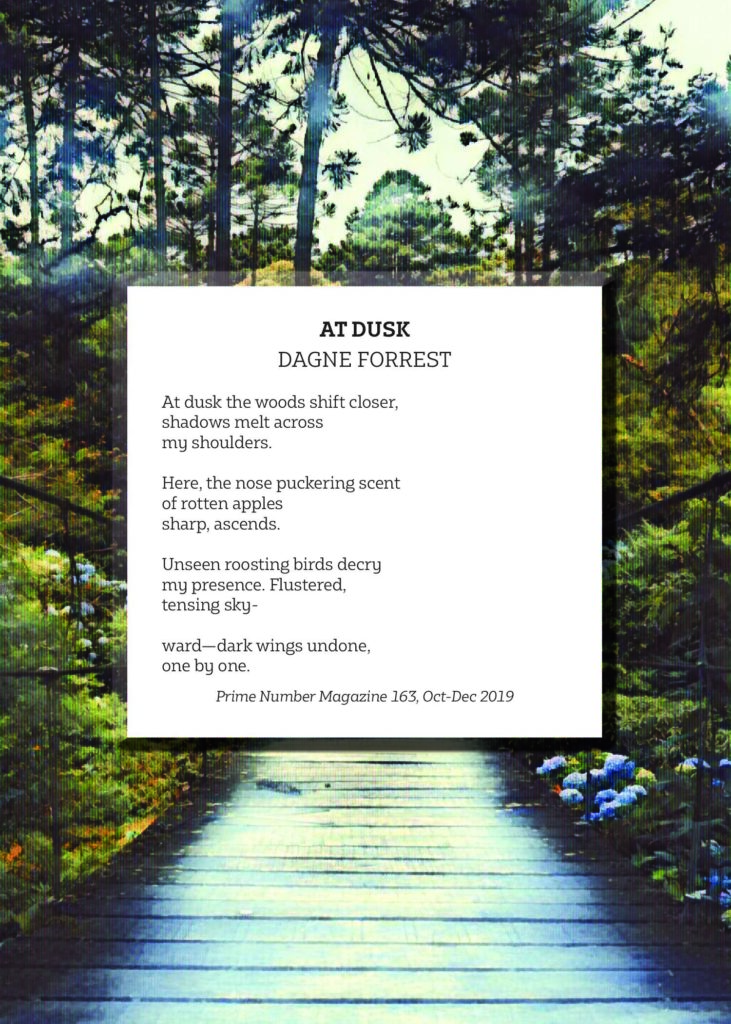
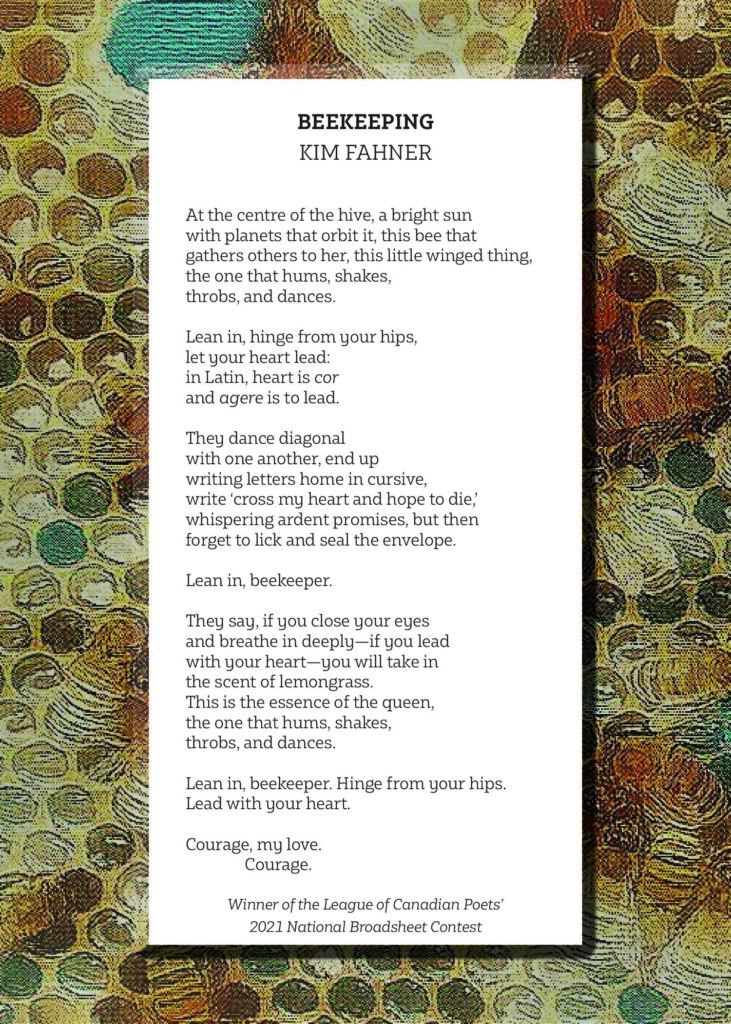
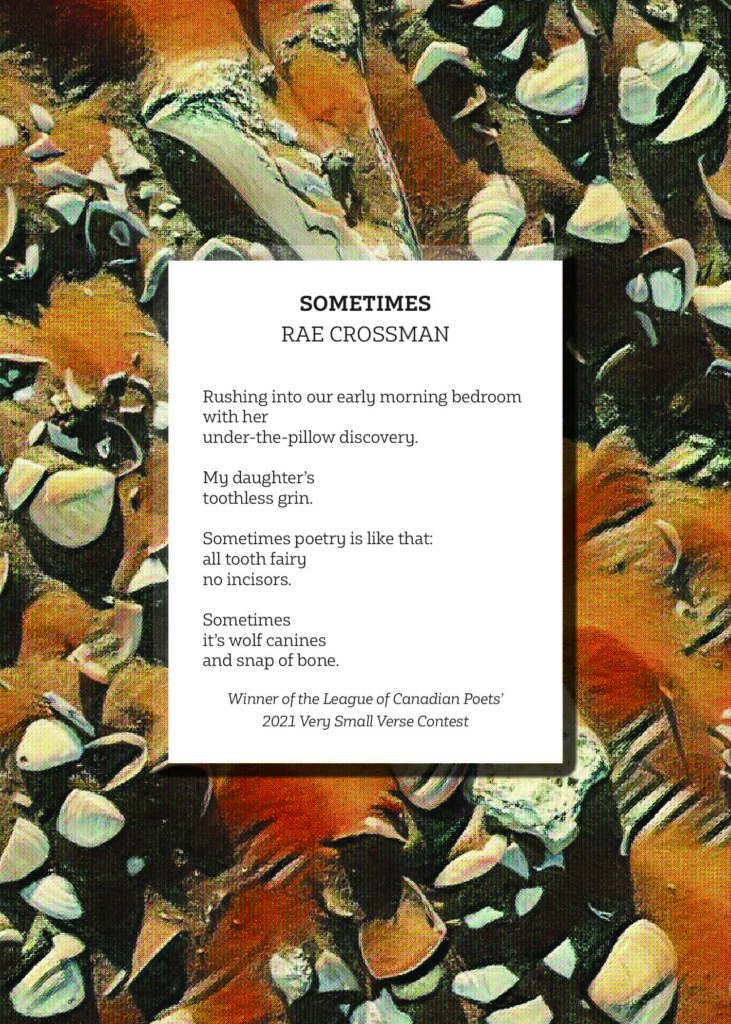
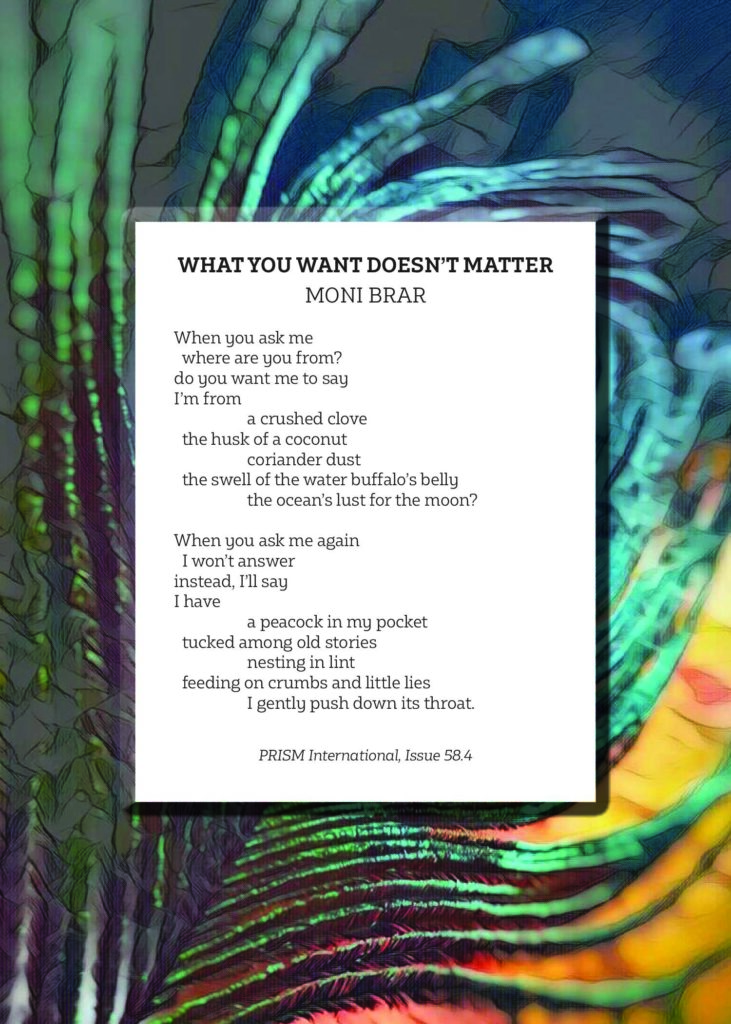
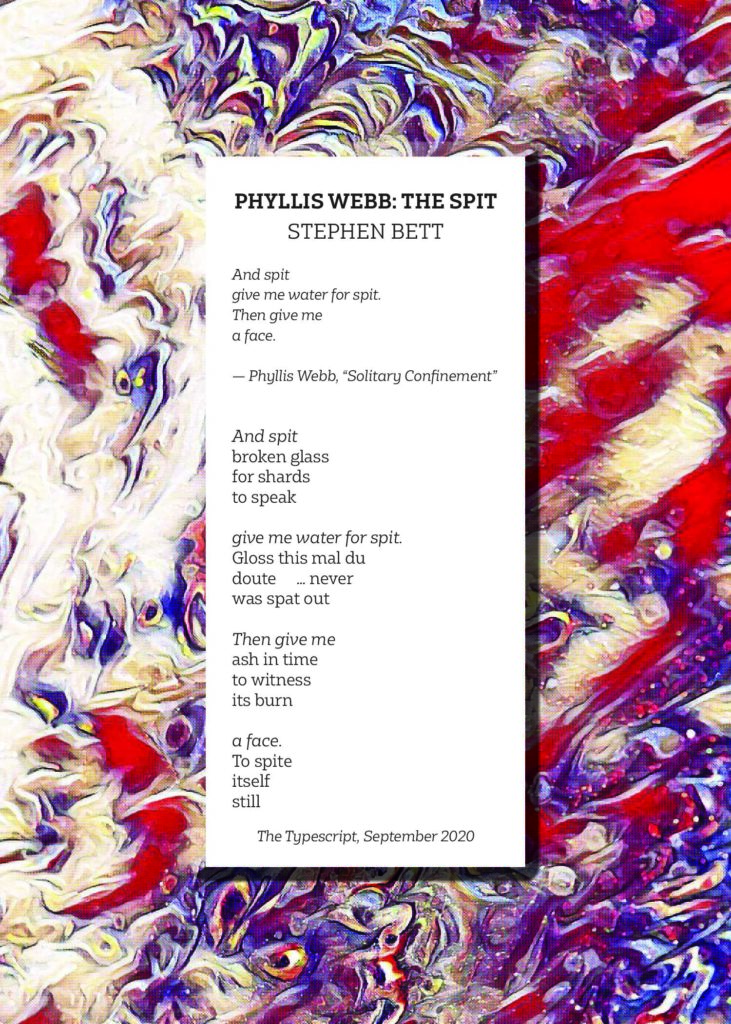
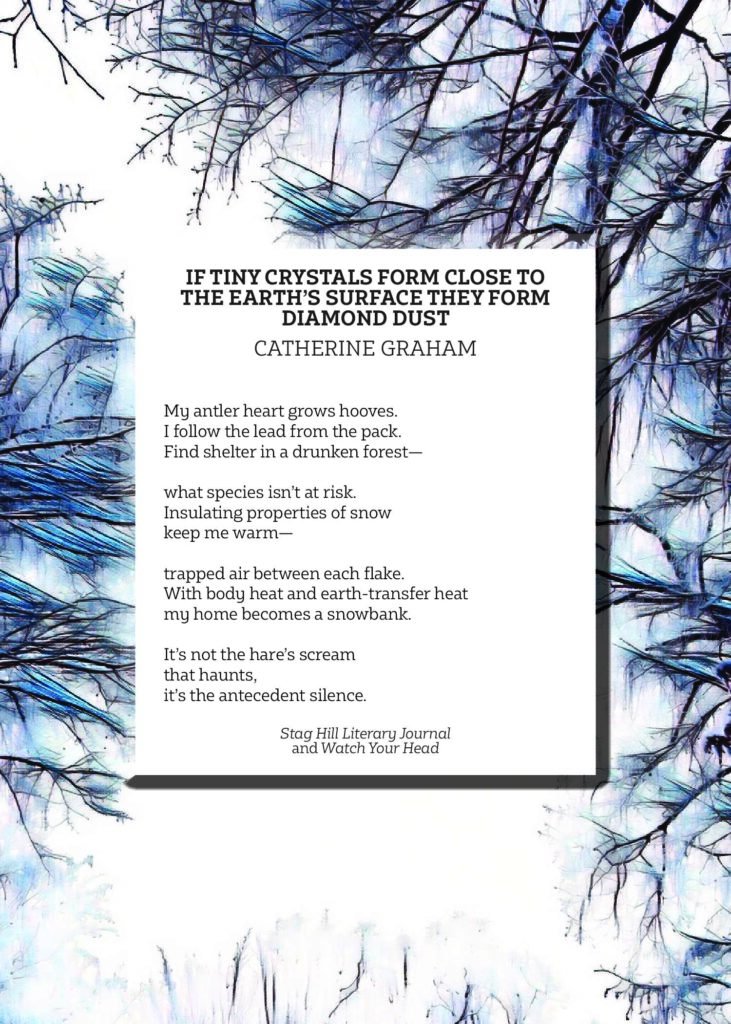
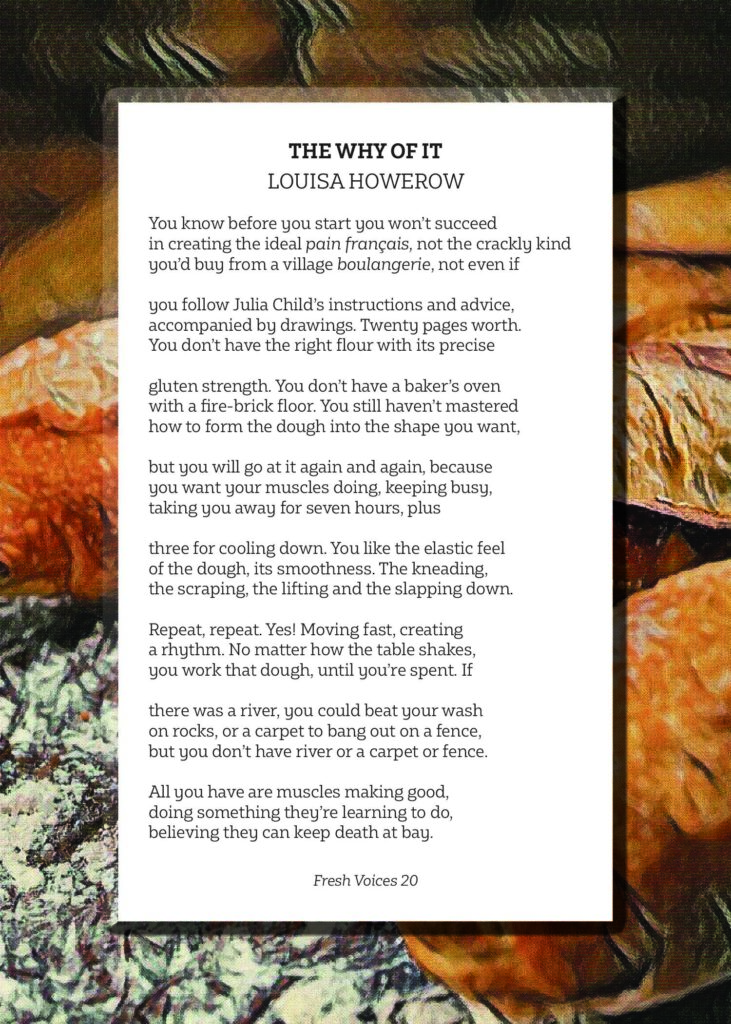
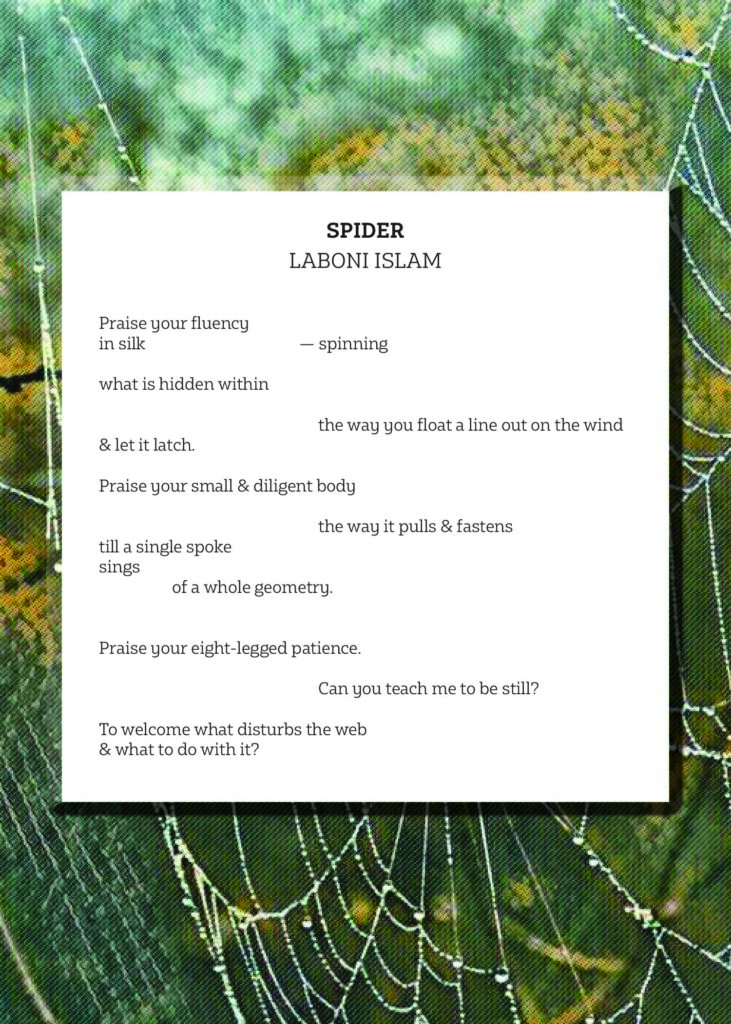
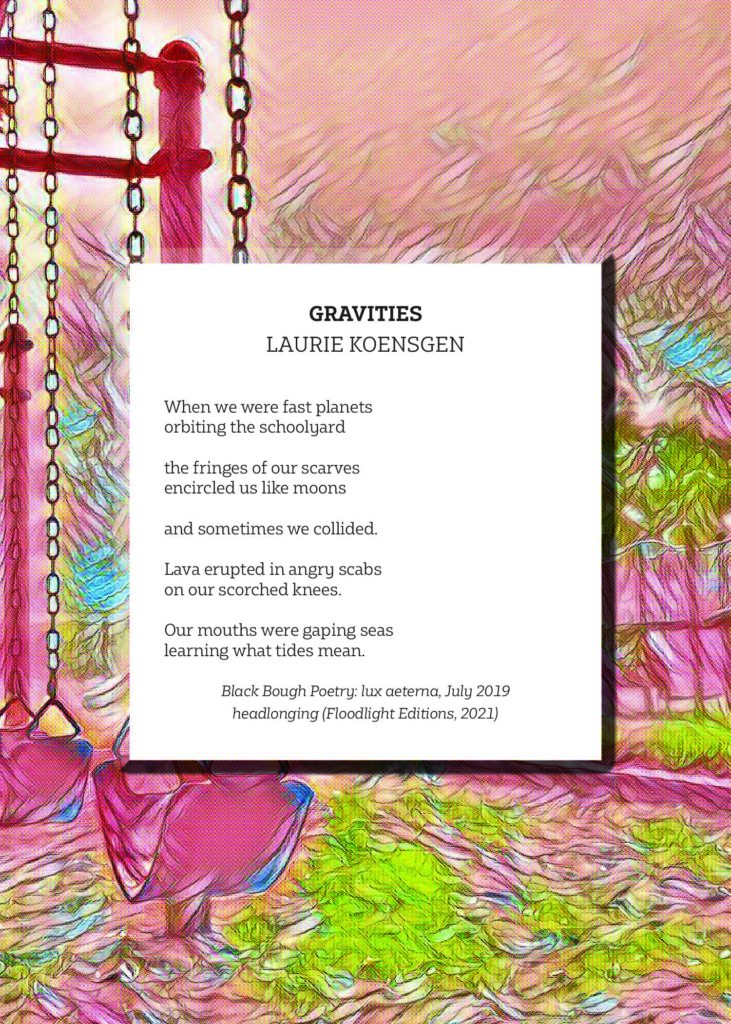
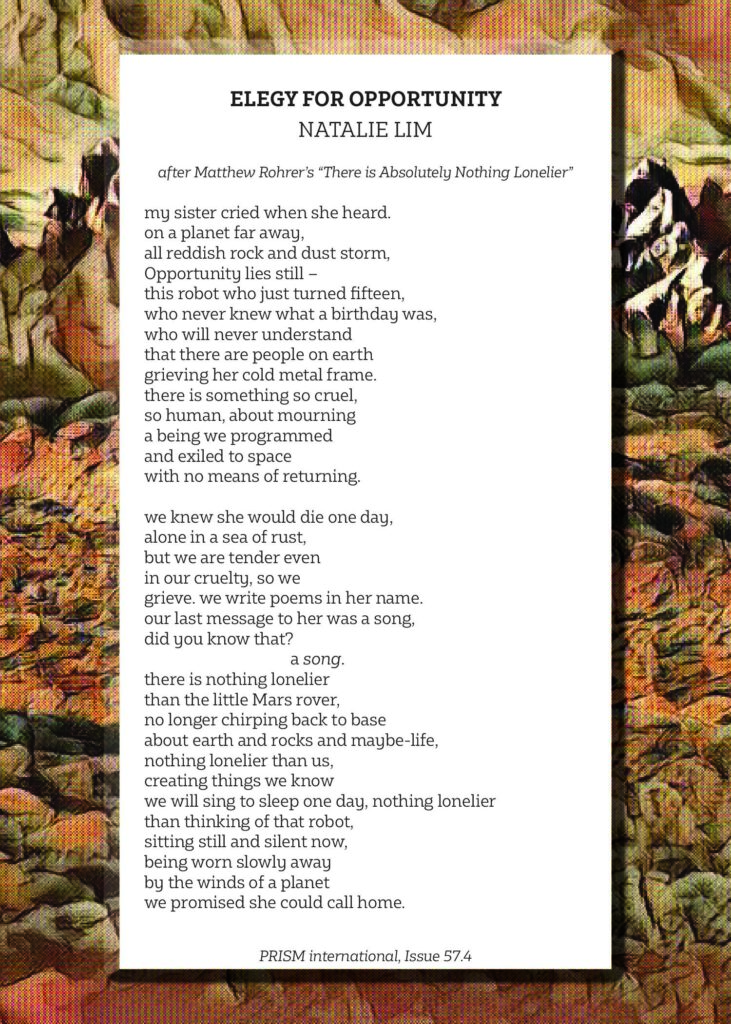
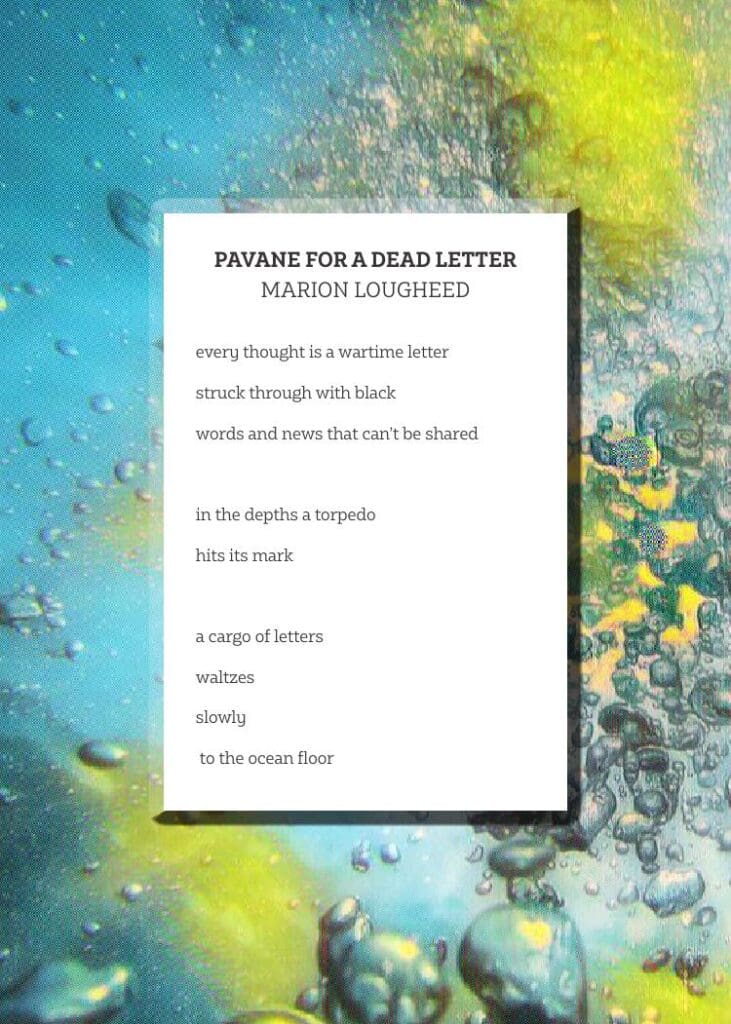
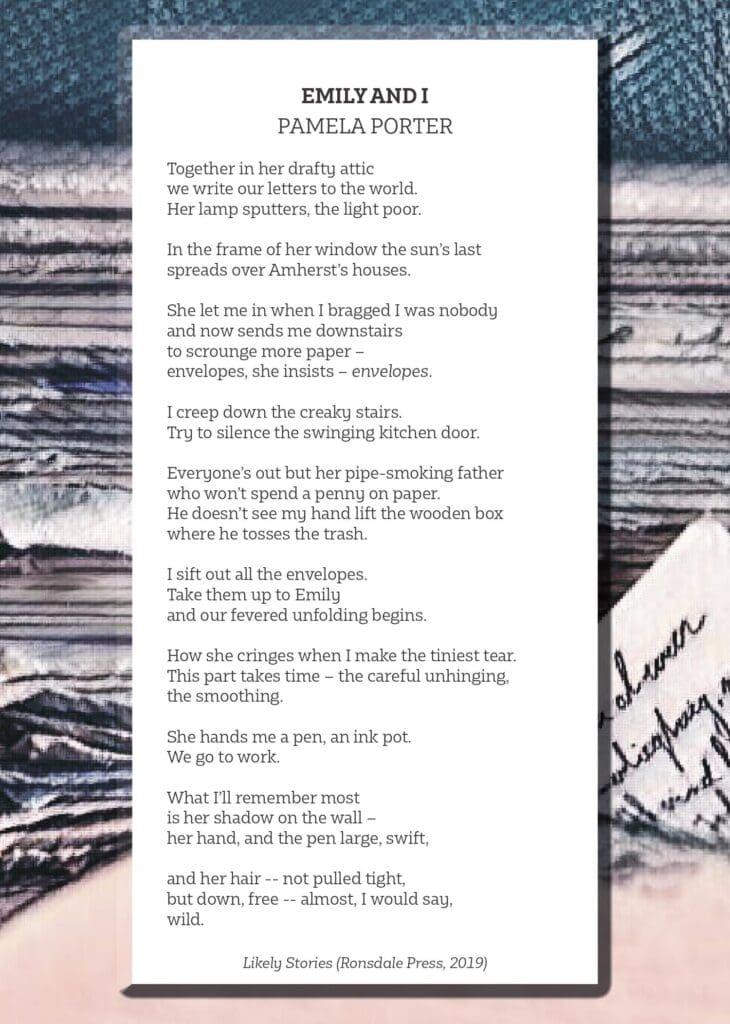
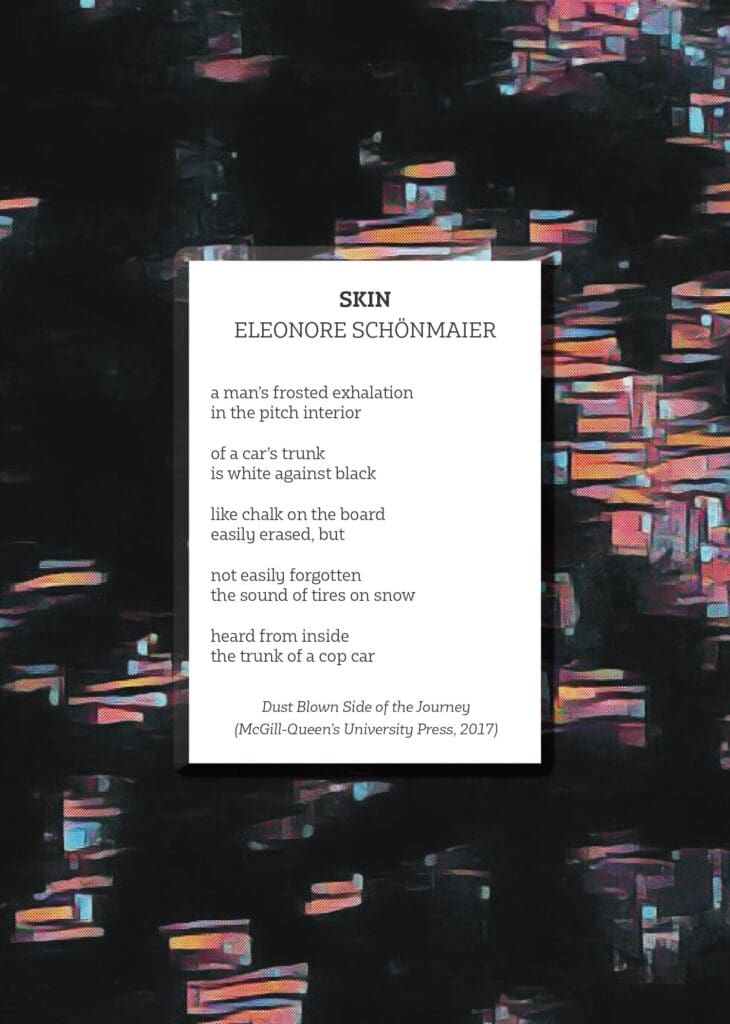

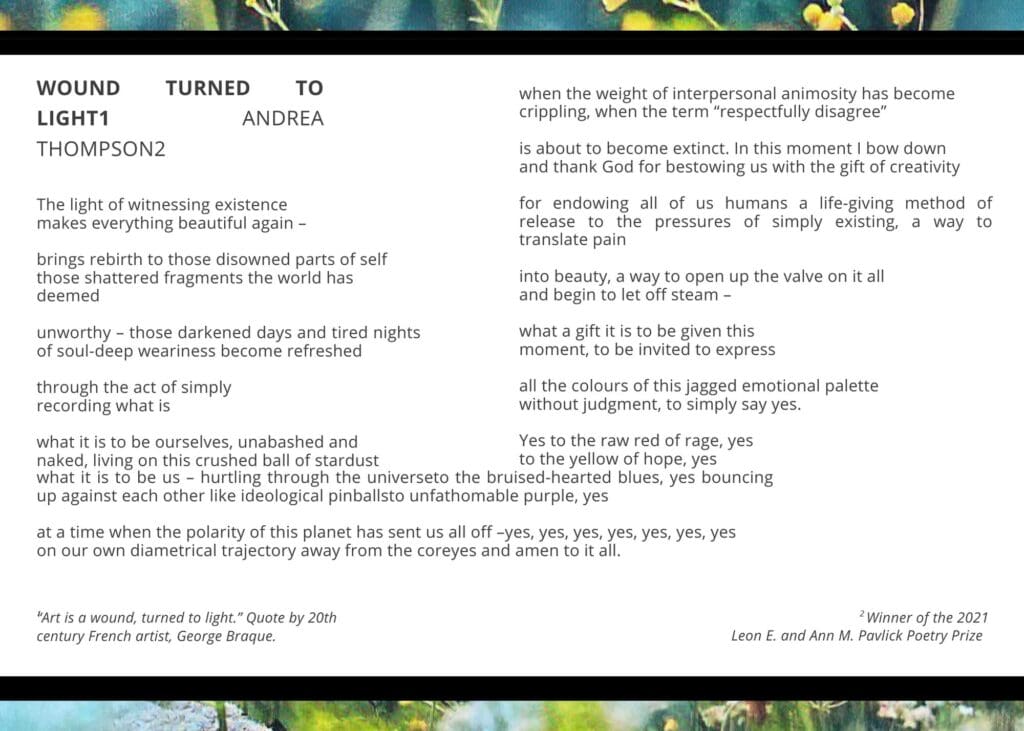
At Dusk
Dagne Forrest
At dusk the woods shift closer,
shadows melt across
my shoulders.
Here, the nose puckering scent
of rotten apples
sharp, ascends.
Unseen roosting birds decry
my presence. Flustered,
tensing sky-
ward—dark wings undone,
one by one.
First published in Prime Number Magazine 163, Oct-Dec 2019
Dagne Forrest lives and works in a small town in Eastern Ontario. She shares her life with several other humans, an athletic labrador retriever who suffers from separation anxiety, three cats, and a small flock of chickens. Her poetry has appeared or will soon appear in Deep Wild Journal, Prime Number Magazine, Not Very Quiet, The Moving Force Journal, The Crank, and Sky Island Journal, and her creative nonfiction in Paper Dragon. Learn more at dagneforrest.com.
—–
Beekeeping
Kim Fahner
At the centre of the hive, a bright sun
with planets that orbit it, this bee that
gathers others to her, this little winged thing,
the one that hums, shakes,
throbs, and dances.
Lean in, hinge from your hips,
let your heart lead:
in Latin, heart is cor and agere is to lead.
They dance diagonal
with one another, end up
writing letters home in cursive,
write ‘cross my heart and hope to die,’
whispering ardent promises, but then
forget to lick and seal the envelope.
Lean in, beekeeper.
They say, if you close your eyes
and breathe in deeply—if you lead
with your heart—you will take in
the scent of lemongrass.
This is the essence of the queen,
the one that hums, shakes,
throbs, and dances.
Lean in, beekeeper. Hinge from your hips.
Lead with your heart.
Courage, my love.
Courage.
Winner of the League of Canadian Poets’ 2021 National Broadsheet Contest
Kim Fahner lives, writes, and teaches in Sudbury, Ontario. She was Poet Laureate of Sudbury from 2016-18, and was the first woman appointed to that role. Her most recent book of poems is These Wings (Pedlar Press, 2019). Kim is a member of the League of Canadian Poets, and is a supporting member of the Playwrights Guild of Canada. She’s also the Ontario Representative for The Writers’ Union of Canada (2020-22). Presently, Kim is working on finishing her new novel, The Painted Birds. She can be reached via her author website at www.kimfahner.com.
—–
Sometimes
Rae Crossman
Rushing into our early morning bedroom
with her
under-the-pillow discovery.
My daughter’s
toothless grin.
Sometimes poetry is like that:
all tooth fairy no incisors.
Sometimes
it’s wolf canines
and snap of bone.
Winner of the League of Canadian Poets’ 2021 Very Small Verse Contest
Living on the Haldimand Tract in Kitchener, Ontario, Rae Crossman writes poetry both for the page and for oral performance. He has published poems in literary magazines and dramatized them on theatre stages, in classrooms, and around campfires on canoe trips. Working with dancers, musicians, and visual artists, he is particularly interested in the collaborative process of creativity. Joint projects include storytelling, choral compositions, and theatrical pieces set in natural environments.
—–
What You Want Doesn’t Matter
Moni Brar
When you ask me
where are you from?
do you want me to say
I’m from
a crushed clove
the husk of a coconut
coriander dust
the swell of the water buffalo’s belly
the ocean’s lust for the moon?
When you ask me again
I won’t answer
instead, I’ll say
I have
a peacock in my pocket
tucked among old stories
nesting in lint
feeding on crumbs and little lies
I gently push down its throat.
First published in PRISM International, Issue 58.4
Moni Brar is a Punjabi-Sikh poet, educator, and farmer. She was born in northern India and now divides her time between the unsurrendered territories of the Treaty 7 Region and the Syilx Nation. Her writing explores diasporan guilt, cultural identities, religious violence, and intergenerational trauma resulting from colonization. Her poetry has been nominated for a Pushcart Prize and an Alberta Magazine Award, and shortlisted for PRISM international’s Lit Prize for Short Forms, FreeFall Magazine’s Annual Poetry Contest, and The Vallum Award for Poetry. Her most recent work is forthcoming in Passages North, Prairie Fire, Hart House Review, Vallum and The Avalon Literary Review. She believes literature and art contain the possibility of personal and collective healing.
—–
Phyllis Webb: The Spit
Stephen Bett
And spit
give me water for spit.
Then give me
a face.
— Phyllis Webb, “Solitary Confinement”
And spit
broken glass
for shards
to speak
give me water for spit.
Gloss this mal du
doute … never
was spat out
Then give me
ash in time
to witness
its burn
a face.
To spite
itself
still
First published in The Typescript, September 2020
Stephen Bett is a widely and internationally published Canadian poet with 24
books in print. His personal papers are archived in the “Contemporary Literature
Collection” at Simon Fraser University. His website is stephenbett.com.
—–
IF TINY CRYSTALS FORM CLOSE TO THE EARTH’S SURFACE THEY FORM DIAMOND DUST
Catherine Graham
My antler heart grows hooves.
I follow the lead from the pack.
Find shelter in a drunken forest—
what species isn’t at risk.
Insulating properties of snow
keep me warm—
trapped air between each flake.
With body heat and earth-transfer heat
my home becomes a snowbank.
It’s not the hare’s scream
that haunts,
it’s the antecedent silence.
First published in Stag Hill Literary Journal; also published in Watch Your Head
Catherine Graham’s sixth poetry collection, The Celery Forest, was named a CBC Best Book of the Year and was a finalist for the Fred Cogswell Award for Excellence in Poetry. She teaches creative writing at the University of Toronto where she won an Excellence in Teaching Award. A previous winner of the Toronto International Festival of Authors’ Poetry NOW, she leads their monthly Book Club. Her seventh collection, Æther: An Out-of-Body Lyric, was recently released with Wolsak & Wynn /Buckrider Books. Visit: www.catherinegraham.com @catgrahampoet
—–
The Why of It
Louisa Howerow
You know before you start you won’t succeed
in creating the ideal pain français, not the crackly kind
you’d buy from a village boulangerie, not even if
you follow Julia Child’s instructions and advice,
accompanied by drawings. Twenty pages worth.
You don’t have the right flour with its precise
gluten strength. You don’t have a baker’s oven
with a fire-brick floor. You still haven’t mastered
how to form the dough into the shape you want,
but you will go at it again and again, because
you want your muscles doing, keeping busy,
taking you away for seven hours, plus
three for cooling down. You like the elastic feel
of the dough, its smoothness. The kneading,
the scraping, the lifting and the slapping down.
Repeat, repeat. Yes! Moving fast, creating
a rhythm. No matter how the table shakes,
you work that dough, until you’re spent. If
there was a river, you could beat your wash
on rocks, or a carpet to bang out on a fence,
but you don’t have river or a carpet or fence.
All you have are muscles making good,
doing something they’re learning to do,
believing they can keep death at bay.
First published in Fresh Voices 20
Louisa Howerow‘s poems have appeared in a number of anthologies, among them: Gush: Menstrual Manifestos for Our Times (Frontenac House), and Another Dysfunctional Cancer Poem Anthology (Mansfield Press). Her poem, “Why Scrabble,” was selected for Poem in Your Pocket, 2020.
—–
Spider
Laboni Islam
Praise your fluency
in silk — spinning
what is hidden within
the way you float a line out on the wind
& let it latch.
Praise your small & diligent body
the way it pulls & fastens
till a single spoke
sings
of a whole geometry.
Praise your eight-legged patience.
Can you teach me to be still?
To welcome what disturbs the web
& what to do with it?
Laboni Islam was born in Canada to Bangladeshi parents. “Lunar Landing, 1966” was shortlisted for the CBC Poetry Prize (2017). Her poetry appears in canthius, wildness, and The Unpublished City Anthology (Book*hug Press, 2017), shortlisted for the Toronto Book Award (2018). She serves as an arts educator, animating the gap between art and young audiences.
—–
Gravities
Laurie Koensgen
When we were fast planets
orbiting the schoolyard
the fringes of our scarves
encircled us like moons
and sometimes we collided.
Lava erupted in angry scabs
on our scorched knees.
Our mouths were gaping seas
learning what tides mean.
First published in Black Bough Poetry: lux aeterna, July 2019; also appeared in headlongling (Floodlight Editions, 2021)
Laurie Koensgen is a writer and educator living in Ottawa. Her poetry has appeared in journals, anthologies and online magazines across North America and in the UK. She was shortlisted for The Malahat Review’s Far Horizons Award for Poetry 2018, and received Honourable Mentions in Arc’s Diana Brebner Prize 2018 and The New Quarterly’s Occasional Verse Contest 2019. Laurie is a long-time advocate for the professional arts and their inclusion in schools. She’s a founding member of the Ruby Tuesdays poetry collective. Her first chapbook, headlonging, was just released with Floodlight Editions.
—–
Elegy for Opportunity
Natalie Lim
after Matthew Rohrer’s “There is Absolutely Nothing Lonelier”
my sister cried when she heard.
on a planet far away,
all reddish rock and dust storm,
Opportunity lies still –
this robot who just turned fifteen,
who never knew what a birthday was,
who will never understand
that there are people on earth
grieving her cold metal frame.
there is something so cruel,
so human, about mourning
a being we programmed
and exiled to space
with no means of returning.
we knew she would die one day,
alone in a sea of rust,
but we are tender even
in our cruelty, so we
grieve. we write poems in her name.
our last message to her was a song,
did you know that?
a song.
there is nothing lonelier
than the little Mars rover,
no longer chirping back to base
about earth and rocks and maybe-life,
nothing lonelier than us,
creating things we know
we will sing to sleep one day, nothing lonelier
than thinking of that robot,
sitting still and silent now,
being worn slowly away
by the winds of a planet
we promised she could call home.
First published in PRISM international, Issue 57.4
Natalie Lim is a Chinese-Canadian poet living on the unceded, traditional territories of the Musqueam, Squamish and Tsleil-Waututh peoples (Vancouver, BC). She is the winner of the 2018 CBC Poetry Prize and Room Magazine’s 2020 Emerging Writer Award, with work published in Arc Poetry Magazine, Best Canadian Poetry 2020 and elsewhere. You can find her on Twitter at @nataliemlim.
—–
Pavane for a Dead Letter
Marion Lougheed
every thought is a wartime letter
struck through with black
words and news that can’t be shared
in the depths a torpedo
hits its mark
a cargo of letters
waltzes
slowly
to the ocean floor
Marion Lougheed is a reader, writer, poet, and anthropologist. Her short fiction has been published by The Capra Review, Landwash, The Basil O’Flaherty, and Paragon Press. She grew up in Canada, Benin, Belgium and Germany, and spent a summer living on a sailboat in Vancouver with her partner.
—–
Emily and I
Pamela Porter
Together in her drafty attic
we write our letters to the world.
Her lamp sputters, the light poor.
In the frame of her window the sun’s last
spreads over Amherst’s houses.
She let me in when I bragged I was nobody
and now sends me downstairs
to scrounge more paper –
envelopes, she insists – envelopes.
I creep down the creaky stairs.
Try to silence the swinging kitchen door.
Everyone’s out but her pipe-smoking father
who won’t spend a penny on paper.
He doesn’t see my hand lift the wooden box
where he tosses the trash.
I sift out all the envelopes.
Take them up to Emily
and our fevered unfolding begins.
How she cringes when I make the tiniest tear.
This part takes time – the careful unhinging,
the smoothing.
She hands me a pen, an ink pot.
We go to work.
What I’ll remember most
is her shadow on the wall –
her hand, and the pen large, swift,
and her hair — not pulled tight,
but down, free — almost, I would say,
wild.
First published in Likely Stories (Ronsdale Press, 2019)
Pamela Porter is the author of 15 published books –- 11 volumes of poetry and four books for children and young adults. Her work has earned more than a dozen provincial, national, and international awards, including the Governor General’s Award in Children’s Literature for The Crazy Man, and the CBC, Raymond Souster, Pat Lowther and Montreal International Poetry Prize shortlists. Both The Crazy Man and I’ll Be Watching are taught in classrooms in schools across Canada. Pamela lives near Sidney, BC with her family and a menagerie of rescued horses, dogs, and cats.
—–
Skin
Eleonore Schönmaier
a man’s frosted exhalation
in the pitch interior
of a car’s trunk
is white against black
like chalk on the board
easily erased, but
not easily forgotten
the sound of tires on snow
heard from inside
the trunk of a cop car
First published in Dust Blown Side of the Journey (McGill-Queen’s University Press, 2017)
Eleonore Schönmaier‘s new collection Field Guide to the Lost Flower of Crete is forthcoming in June 2021 from McGill-Queen’s University Press. Wavelengths of Your Song (MQUP, 2013) was published in German translation as Wellenlängen deines Liedes in 2020 by parasitenpresse (Cologne). Dust Blown Side of the Journey (MQUP) was a finalist for the Eyelands Book Awards 2020 (Greece). She has won the Alfred G. Bailey Prize, the Earle Birney Prize, and the 2019 National Broadsheet Contest among others. Her poetry has been widely anthologized including in Best Canadian Poetry. Greek, Dutch, Scottish, American and Canadian composers have set her poems to music. Find her online at eleonoreschonmaier.com
—–
The Walk
Margo Wheaton
(For my father)
After the worst of it, after the days of the black nets
that entangled you, that wrapped
themselves around your will as you lay
in the starched anonymity
of the new bed in the seniors home,
I see you at the end of the hall,
just reaching it—the white vinyl—
plastic window that gazed directly into the woods,
filling with wild green light.
You were bent and curved like a fish’s
mouth, down-turned, ferning into
yourself as you gripped the sides of the hated walker,
hanging like an empty shirt.
I know you won’t succeed in this, but there’s
something in the measured gait,
the shuck forward, as if you could
escape the swelling sky of circumstance
if you just kept walking.
Like a man who’s overdosed
and mustn’t sleep, you swim your
ruined body forward, each glittering
step a sand-shoal
holding back the sea.
First published in The Fiddlehead, 75th Anniversary Issue
Margo Wheaton lives and writes in Halifax. Her debut poetry collection The Unlit Path Behind the House (McGill-Queen’s University Press) received a Canadian Authors Association Award and was shortlisted for the Atlantic Poetry Prize, the Gerald Lampert Award, the Fred Cogswell Award for Literary Excellence, and the Relit Award. Margo’s an associate editor at The Dalhousie Review and has served as a poetry mentor for the Writers Federation of Nova Scotia. Wild Green Light, a collaborative book of poems she co-authored with David Adams Richards, is forthcoming this spring.
—–
Wound Turned to Light1
Andrea Thompson
The light of witnessing existence what a gift it is to be given this
makes everything beautiful again – moment, to be invited to express
brings rebirth to those disowned parts of self all the colours of this jagged emotional palette
those shattered fragments the world has deemed without judgement, to simply say yes.
unworthy – those darkened days and tired nights Yes to the raw red of rage, yes
of soul-deep weariness become refreshed to the yellow of hope, yes
through the act of simply to the bruised-hearted blues, yes
recording what is to unfathomable purple, yes
what it is to be ourselves, unabashed and yes, yes, yes, yes, yes, yes, yes
naked, living on this crushed ball of stardust yes and amen to it all.
what it is to be us – hurtling through the universe
bouncing up against each other like ideological pinballs
at a time when the polarity of this planet has sent us all off –
on our own diametrical trajectory away from the core
when the weight of interpersonal animosity has become
crippling, when the term “respectfully disagree”
is about to become extinct. In this moment I bow down
and thank God for bestowing us with the gift of creativity
for endowing all of us humans a life-giving method of release
to the pressures of simply existing, a way to translate pain
into beauty, a way to open up the valve on it all
and begin to let off steam – 1. “Art is a wound, turned to light.” Quote by 20th
century French artist, George Bra Braque.
Andrea Thompson is the winner of the 2021 Leon E. and Ann M. Pavlick Poetry Prize
Andrea Thompson is a poet, novelist, educator and editor at Brick Books. Her spoken word album One was nominated for a Canadian Urban Music Award, her album Soulorations helped earn her a Sheri-D Wilson Golden Beret Award for Excellence, and she is the recipient of the 2021 Leon E. & Ann M. Pavlick Prize for Poetry. Her collection A Selected History of Soul Speak is out with Frontenac House as a part of their Quartet series in the fall of 2021.
